The All India Services (AIS) comprises the Indian Administrative Service, Indian Police Service and Indian Forest Service. A unique feature of the All India Services is that the members of these services are recruited by the centre, but their services are placed under various State cadres, and they have the ability to serve both under the State and under the centre. Due to the federal polity of the country, this is considered one of the tools that makes union government stronger than state governments. Officers of these three services comply to the All India Services Rules relating to pay, conduct, leave, various allowances etc.

The Indian Institute of Forest Management (IIFM), founded 1982, is an autonomous, Natural Resource Service training institute of Forestry located in Bhopal, Madhya Pradesh, India, established by the Ministry of Environment, Forest and Climate Change, Government of India with financial assistance from the Swedish International Development Cooperation Agency (SIDA) and course assistance from the Indian Institute of Management Ahmedabad for mid career training of Indian Forest Service cadre and all State Forest Service cadre in India. The institute's objective is to fulfill the growing need for the managerial human resource in the area of Forest, Environment, and Natural resources Management and allied sectors. The institute is headed by a director selected and appointed by the Ministry of Environment, Forest and Climate Change, Government of India.
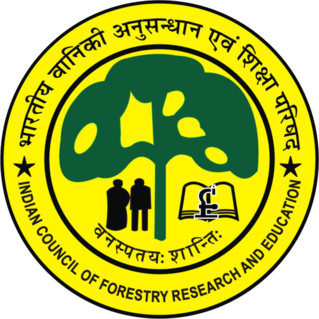
The Indian Council of Forestry Research and Education (ICFRE) is an autonomous organisation or governmental agency under the Ministry of Environment and Forests, Government of India. Headquartered in Dehradun, its functions are to conduct forestry research; transfer the technologies developed to the states of India and other user agencies; and to impart forestry education. The council has 9 research institutes and 4 advanced centres to cater to the research needs of different bio-geographical regions. These are located at Dehradun, Shimla, Ranchi, Jorhat, Jabalpur, Jodhpur, Bengaluru, Coimbatore, Prayagraj, Chhindwara, Aizawl, Hyderabad and Agartala.
The Ministry of Environment, Forest and Climate Change (MoEFCC) is an Indian government ministry. This ministry is headed by Secretary Rank senior most IAS officer. The ministry portfolio is currently held by Bhupender Yadav, Union Minister of Environment, Forest and Climate Change.
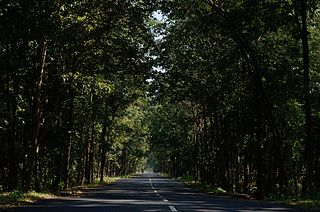
Social forestry is the management and protection of forests and afforestation of barren and deforested lands with the purpose of helping environmental, social and rural development. The term social forestry was first used in 1976 by The National Commission on Agriculture, when the government of India aimed to reduce pressure on forests by planting trees on all unused and fallow lands. It was intended as a democratic approach to forest conservation and usage, maximizing land utilization for multiple purposes.

Forestry in India is a significant rural industry and a major environmental resource. India is one of the ten most forest-rich countries of the world. Together, India and 9 other countries account for 67 percent of total forest area of the world. India's forest cover grew at 0.20% annually over 1990–2000, and has grown at the rate of 0.7% per year over 2000–2010, after decades where forest degradation was a matter of serious concern.

Chandra Prakash Kala is an Indian ecologist and professor. His research interests include alpine ecology, conservation biology, indigenous knowledge systems, ethnobotany and medicinal aromatic plants. He is an assistant professor in the faculty area of Ecosystem and Environment Management at the Indian Institute of Forest Management.
Indira Priyadarshini Vriksha Mitra Awards or IPVM Awards are given by Ministry of Environment and Forests of Government of India to individuals and institutions who have done pioneering and exemplary work in the field of afforestation and wasteland development. A cash award of Rupees Two lakh fifty thousand is presented to individuals/institutions in seven categories. It was instituted in 1986 and were given annually. Initially, IPVM awards were given in twelve categories till 2006. But as per 2012 notification of Ministry of Environment and Forests Seven Categories are approved for IPVM Awards.
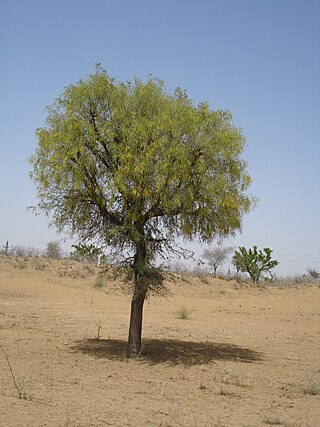
Arid Forest Research Institute (ICFRE-AFRI) is a research institute situated in Jodhpur, Rajasthan, India. The institute conducts scientific research in forestry in order to provide technologies to increase the vegetative cover and to conserve biodiversity in the hot arid and semi-arid regions of Rajasthan and Gujarat. It operates under the Indian Council of Forestry Research and Education (ICFRE) of the Ministry of Environment and Forests, Government of India.

Institute of Wood Science and Technology (IWST) is a Research institute situated in Bangalore in Karnataka. It works under the Indian Council of Forestry Research and Education (ICFRE) of the Ministry of Environment and Forests, Govt. of India. It is recognized to be a Centre of Excellence for Sandalwood Research and Wood Science

Tropical Forest Research Institute (TFRI) is a Research institute situated in Jabalpur in Madhya Pradesh. It works under the Indian Council of Forestry Research and Education (ICFRE) of the Ministry of Environment, Forest and Climate Change, Government of India.
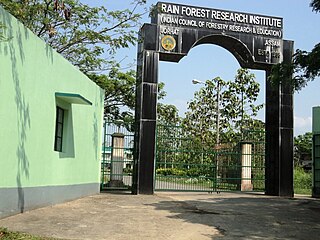
Rain Forest Research Institute (RFRI) is a research institute situated in Jorhat in Assam. It works under the Indian Council of Forestry Research and Education (ICFRE) of the Ministry of Environment, Forest and Climate Change, Government of India.
Himalayan Forest Research Institute (HFRI) is a Research institute situated in Shimla in Himachal Pradesh. It works under the Indian Council of Forestry Research and Education (ICFRE) of the Ministry of Environment and Forests, Govt. of India.
Institute of Forest Biodiversity (IFB) is a research institute situated in Hyderabad in the state of Telangana, India. It works under the Indian Council of Forestry Research and Education (ICFRE) of the Ministry of Environment, Forests and Climate Change, Government of India.
The Institute of Forest Productivity (IFP) is a research institute situated in Ranchi in state of Jharkhand. It works under the Indian Council of Forestry Research and Education (ICFRE) of the Ministry of Environment, Forest and Climate Change, Government of India.
The Centre for Forestry Research and Human Resource Development Chhindwara was established in 1995 as an advanced research centre under the umbrella of ICFRE, Dehradun.
Centre for Forest-based Livelihoods and Extension (CFLE) is an Advanced Research Centre situated in Agartala in Tripura. It works under the Indian Council of Forestry Research and Education (ICFRE) of the Ministry of Environment and Forests, Govt. of India.
Van Vigyan Kendra (VVK) or Forest Science Centres (FSC) has been established by Indian Council of Forestry Research and Education (ICFRE) of the Ministry of Environment and Forests, Govt. of India. It intends to help disseminate various technologies developed by farmers, forest based industries and forest research institutes.
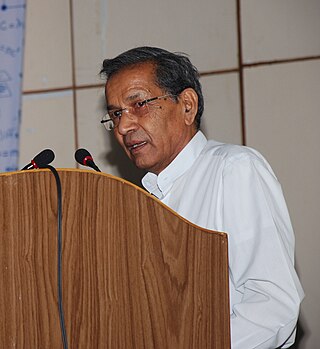
Aditya Narayan Purohit is an Indian scientist and professor who has mainly worked on ecophysiology of tree species and physiology of high altitude medicinal plants. He was born in village Kimni, Dist. Chamoli. He has served as the Vice-Chancellor of Hemwati Nandan Bahuguna Garhwal University and as director of the university's High Altitude Plant Physiology Research Center. He was also the Director of Govind Ballabh Pant Institute of Himalayan Environment and Development from 1990 to 1995. Purohit was awarded Padma Shri, the fourth highest civilian award of India, by the President of India in 1997 for his valuable scientific contribution in Indian mountains.















